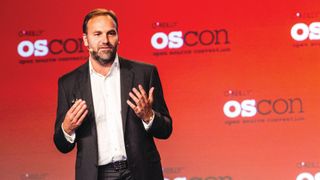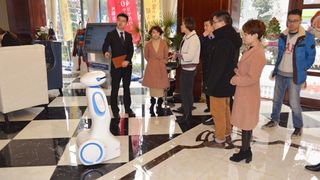What happened at Canonical
A tale of town halls, tears, IPOs and brutal lay-offs
Canonical cause
That last quote might seem naive to anyone working in the corporate world, but Canonical’s painful transformation has to be framed in the context of its origins as a company that sees open source as an empowering force for good and positive change.
Even its Linux distribution, Ubuntu, is named after an African philosophy that is concerned with humanity towards others. To quote Archbishop Desmond Tutu, a person with Ubuntu has “a proper self-assurance that comes from knowing that he or she belongs in a greater whole and is diminished when others are humiliated or diminished...”
Working for Canonical, particularly when it comes to long-serving employees, was and is more than a job: “People joined Canonical for ‘the cause’”, explained one staff member. “We have been fighting for the movement of open source and we all were passionate about making the Linux client (desktop, phone, TV, etc) happen. People made compromises at Canonical that nobody would do anywhere else. People worked around the clock, spent weekends and nights on workshops. We all adapted to difficult time-zones to work together with very remote colleagues. We all were – and still are – full-time evangelists of Ubuntu.”

Shares and shares alike?
This is perhaps why Shuttleworth has offered share options to all employees. TechRadar Pro was supplied with a transcript of what was said at town halls prior to lay-offs, where Shuttleworth stated: “We'll set aside a block of equity for every employee today, uh, and no matter what happens to you as an individual, um, you can bet that you have a stake in Canonical going forward. It's really important to me to recognise that everybody who is at the company today has played a role in getting us here.”
However, to add to the bitter feelings of some departing staff, no mention of the shares was included in the severance contracts that they were required to sign. Opinions were divided over whether shares would be forthcoming – one employee described it as “super-naive” that staff would ever see them after termination. We asked DeepC about this, who speculated that the lack of any mention of shares in contracts was a legal issue: “The shares for everyone were meant to be considered like a gift rather than an obligation, so he [Shuttleworth] has said that he will give it, but he hasn’t put it down in writing because he’s not really sure how it’s going to work.”
In the lead up to IPO, Shuttleworth has also set aside equity for the remaining staff: “Going forward, we're going to take 10% of the company and we're going to write options on that 10% to align everybody's interest in the very specific goals that we're setting year-by-year on this path towards the possibility of being a public company.”
DeepC also confirmed most of these details, including that equity would be paid out “in the bonuses over the following four years building up to IPO.”
Are you a pro? Subscribe to our newsletter
Sign up to the TechRadar Pro newsletter to get all the top news, opinion, features and guidance your business needs to succeed!
A representative for Canonical later told The Register that the offer of equity was a “long-standing offer”, and that it was not part of any severance offer. The spokesperson assured The Register that: “[The offer] is a personal commitment from Mark and is currently in process in the hands of Jane Silber.”
Phone pain
One of the insider emails we received included extracts of employees’ parting comments to their co-workers, and one highlights something that some have failed to acknowledge – that the Ubuntu Phone is the closest to a free and open source mobile phone that the market has seen: “In the end, I think that we managed to ship the phone with the largest percentage of GPL software on it, ever,” says the anonymous staff member. “Not sure that we could ever really prove that, but I'm just gonna say it: free-est phone EVER! Now being stuck deciding whether Apple or Google will violate my privacy first seems primitive.”
Now that UBPort has announced that it will continue to develop the mobile side of Unity and given its past work with Fairphone 2, we could also see Canonical’s work contributing to the most ethical and open source phone on the planet in the future.
However, Canonical insiders close to the mobile side of the Unity project are also angry about the timing of the project’s closure. They claim that it was two to four months from being a real product that people could use, particularly with regard to convergence.
“This is a very common complaint and frustration with how Mark [Shuttleworth] operates,” says DeepC. “He’ll have an idea, but he won’t commit the appropriate resources to make it happen. Some people look at in a very literal way and get annoyed ... but if you look at it objectively, really what he’s trying to do is to disrupt things, shake things up, but he doesn’t actually want to be involved in that business. He doesn’t actually want to become a phone OS manufacturer, he just wants to make a few ripples in the pond of phone OSes.”

Firm focus
The days of treating the company as an expensive hobby or tolerating acceptable annual losses (the group lost $3.3 million – around £2.6 million – in its last accounts) are now over. The firm’s focus needs to be on what works for the business, which Shuttleworth believes is Ubuntu, cloud and IoT.
On the OS side, according to Barton George, the man behind bringing Ubuntu to the Dell XPS and Senior Architect at Dell EMC, Ubuntu (and Linux) is selling well: “We don’t release specifics around sales volumes and financials, however, customer demand remains high and our engineers and developers continue to work with partners to develop the most innovative solutions to meet their needs.”
Gnome may not be a popular desktop choice for all Ubuntu users, but it’s a pragmatic answer for a company that wants to efficiently support the desktop for the average user as well as professionals. With all the usual community drum-beating that centres around a new Ubuntu desktop release, it’s easy to forget Ubuntu’s dominance in the cloud and 17.04 now supports the widest range of containers, from snaps, LXD, Docker and Kubernetes, as well as OpenStack’s latest Ocata release.
This transformation has been painful for Canonical, plus it’s also unclear how much damage has been done to its reputation among open source professionals.
Canonical will emerge from this transformation a more efficient – and likely profitable – corporate entity, but as long as Shuttleworth has access to a public Google+ account, it will always be a colourful company to report on. However, calling many members of the free software community “deeply anti-social” and “muppets” may not be particularly beneficial when the company floats on the stock market.
Note: Canonical was asked for a response to the key points covered in this article on April 11, but did not reply before publication.
(This investigation was first reported in issue 178 of Linux User & Developer).

- Subscribe today! Try 5 issues of Linux User & Developer for £5 by heading to www.imaginesubs.co.uk/spring171
Chris Thornett is the Technology Content Manager at onebite, editor, writer and freelance tech journalist covering Linux and open source. Former editor of Linux User and Developer magazine.

An incredible $100 billion bet to get rid of Nvidia dependence — tech experts reckon Microsoft will build a million-server strong data center that will primarily use critical inhouse components

HP launched a very promising ultra portable XPS13 killer laptop — the 1kg EliteBook 635 Aero G11 is only available in Japan with seemingly no plans for a global launch, but why?
Most Popular



